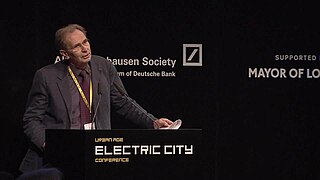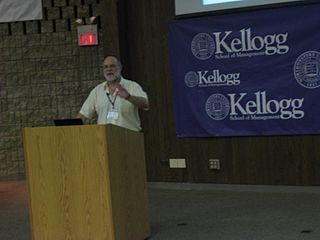
James Joseph Heckman is an American economist and Nobel laureate who serves as the Henry Schultz Distinguished Service Professor in Economics at the University of Chicago, where he is also a professor at the College, a professor at the Harris School of Public Policy, Director of the Center for the Economics of Human Development (CEHD), and Co-Director of Human Capital and Economic Opportunity (HCEO) Global Working Group. He is also a professor of law at the Law School, a senior research fellow at the American Bar Foundation, and a research associate at the NBER. He received the John Bates Clark Medal in 1983, and the Nobel Memorial Prize in Economic Sciences in 2000, which he shared with Daniel McFadden. He is known principally for his pioneering work in econometrics and microeconomics.

The Hoover Institution is an American public policy think tank which promotes personal and economic liberty, free enterprise, and limited government. While the institution is formally a unit of Stanford University, it maintains an independent board of overseers and relies on its own income and donations. It is widely described as conservative, although its directors have contested the idea that it is partisan.
The MIT Department of Economics is a department of the Massachusetts Institute of Technology in Cambridge, Massachusetts.

John Richard Urry was a British sociologist who served as a professor at Lancaster University. He is noted for work in the fields of the sociology of tourism and mobility.

Robin Blackburn is a British historian, a former editor of New Left Review (1983–1999), and emeritus professor in the department of sociology at Essex University.
Marc Leon Nerlove is an American agricultural economist and econometrician and a distinguished university professor emeritus in agricultural and resource economics at the University of Maryland. He was awarded the John Bates Clark Medal from the American Economic Association (AEA) in 1969 and held appointments at eight different universities from 1958–2016. The Clark Medal is awarded to an economist under the age of 40 who “is judged to have made the most significant contribution to economic thought and knowledge”, and when the AEA appointed him as a distinguished fellow in 2012, they cited his development of widely used econometric methods across a range of subjects, including supply and demand, time series analysis, production functions, panel analysis, and family demography.
Christopher Freeman a British economist, recognised as one of the founders of the post-war school of Innovation Studies. He played a lead role in the development of the neo-Schumpeterian tradition focusing on the crucial role of innovation for economic development and of scientific and technological activities for well-being.

Sergiu Hart is an Israeli mathematician and economist. He is the Chairperson of the Humanities Division of the Israel Academy of Sciences and Humanities, and the past President of the Game Theory Society (2008–2010). He is emeritus professor of mathematics and emeritus professor of economics, and member of the Center for the Study of Rationality, at the Hebrew University of Jerusalem in Israel.

A Farewell to Alms: A Brief Economic History of the World is a 2007 book about economic history by Gregory Clark. It is published by Princeton University Press.
William Richard Allen was an American economist, professor and author. He was known for his authorship of economic literature alongside frequent co-author Armen Alchian.
Karl Gunnar Persson was a Swedish economic historian whose contribution lies mainly in comparative European economic history.
William Lazonick is an economist who studies innovation and competition in the global economy.
Sanford M. Jacoby is an American economic historian and labor economist, and Distinguished Research Professor of Management, History, and Public Policy at University of California, Los Angeles. He is known for his studies of the transformation of work in American industry, corporate governance, Japanese management, and welfare capitalism.






